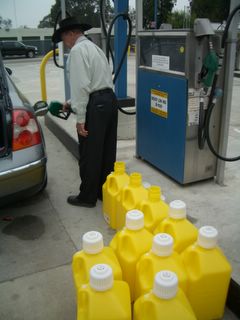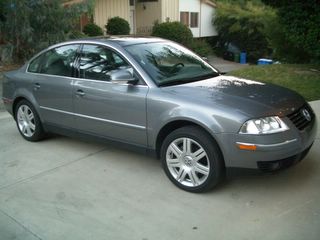Friday, May 27, 2005
Fill'er up
I drive to the DMV at 7:00 am, I’m 20th in line. The place opens at 8:00am. Everything runs very smoothly and I’m out by 8:30 a.m. By the way, diesels are exempt from ever needing a smog certificate in California.
I drive up to Ventura and fill up. Meet the friendly cowboy hat wearing Ted Brown.

Tedd filling up the car and jugs.
He tells me that if the car starts having trouble starting or is feeling sluggish it could mean two things. Either the fuel filter needs to be replaced or the return gas line needs to be replaced. B100 cleans the engine so well over time that all the deposits and junk from dino diesel get eventually caught in the fuel filter so it needs to be replaced. (This of course would not be a problem if you started using B100 on a new diesel engine.) Another problem is that Bio diesel eats thru rubber and if the return gas tube is rubber it will eventually crack and allow air to get in and the car will have trouble starting. Ted claims that a lot of engines have rubber return lines. Jr, Ted’s son, relayed to me that his truck was having problems starting and nobody could figure it out until this mechanic finally replaced the return line.
Ted filled up my car up with 9 gallons in the tank and filled my the 10 5-gallon jugs. All 10 jugs fit in my trunk. I panicked for a second because I forgot to calculate the weight of 50 gallons of B100 (approx. 370 pounds) but the Passat handled it with no problem. In fact, it looked like it could hold another couple hundred pounds in the back seat if needed.
I spent $3.15 per gallon and was more than happy to pay that because I feel I'm doing something to get off oil. Another bonus for me is that my Camry only got 22 mpg hwy and the Passat normally gets 38 mpg on the highway using dino diesel. What mpg I'm going to get is up in the air. B100 Biodiesel has about 5-10% less btu's per gallon than diesel which could cause a drop in mileage. But then there's the new passat engine design and the BioSoy Low Nox product so you have to factor that into the equation. Anyway, I'll know for sure in a couple of days or so when I fill up.
I drove all day with no problems.
I drive up to Ventura and fill up. Meet the friendly cowboy hat wearing Ted Brown.

Tedd filling up the car and jugs.

He tells me that if the car starts having trouble starting or is feeling sluggish it could mean two things. Either the fuel filter needs to be replaced or the return gas line needs to be replaced. B100 cleans the engine so well over time that all the deposits and junk from dino diesel get eventually caught in the fuel filter so it needs to be replaced. (This of course would not be a problem if you started using B100 on a new diesel engine.) Another problem is that Bio diesel eats thru rubber and if the return gas tube is rubber it will eventually crack and allow air to get in and the car will have trouble starting. Ted claims that a lot of engines have rubber return lines. Jr, Ted’s son, relayed to me that his truck was having problems starting and nobody could figure it out until this mechanic finally replaced the return line.
Ted filled up my car up with 9 gallons in the tank and filled my the 10 5-gallon jugs. All 10 jugs fit in my trunk. I panicked for a second because I forgot to calculate the weight of 50 gallons of B100 (approx. 370 pounds) but the Passat handled it with no problem. In fact, it looked like it could hold another couple hundred pounds in the back seat if needed.
I spent $3.15 per gallon and was more than happy to pay that because I feel I'm doing something to get off oil. Another bonus for me is that my Camry only got 22 mpg hwy and the Passat normally gets 38 mpg on the highway using dino diesel. What mpg I'm going to get is up in the air. B100 Biodiesel has about 5-10% less btu's per gallon than diesel which could cause a drop in mileage. But then there's the new passat engine design and the BioSoy Low Nox product so you have to factor that into the equation. Anyway, I'll know for sure in a couple of days or so when I fill up.
I drove all day with no problems.
Tuesday, May 24, 2005
My jugs arrive.
It took a while but the jugs are here.
Monday, May 09, 2005
The Car Arrives
It came over on a huge semi which couldn't come down my street because of the low tree line so he dropped it off on the main street. The wife and I walked over and we wondered if I was just going to be another piece of road kill on the information super highway. The trucker drove it off and it was beautiful. Mint condition with 10k miles just like the dealer said. The wife and I got in and drove it around the block. Yes, this was the first time I’d driven a Passat, ever! It definately handles better than a Camry. There was hardly any gas in it so I filled it up with a couple gallons of dino diesel so I could get to Ventura in a couple weeks for my B100 Low Nox stuff. But I have to wait for my gas jugs to arrive.
Friday, May 06, 2005
Need jugs
I find a site that sells space efficient 5 gallon jugs so I can store my B100. I buy 10 of them. Color yellow of course. I calculate 50 gallons should last me 6 weeks.
BioSoy Low Nox (B100)
Finally, I after reading through some more bio diesel forums I stumble across a reference to Ted Brown in Ventura California (40 minutes from me) who has a product called BioSoy Low NOX. I find his site and cheer. http://www.biosoylownox.com/ This gentlemen takes B100 and mixes in a bio friendly catalysis that makes it low NOX, gives the car more power and cuts smoke by 50%. Amazing. It’s all too good to be true but it is. This special catalysis has been used in Ireland for more than 20 years. You can read about it at http://www.dipetane.20fr.com/ or http://www.dipatane.com. Here's the low down on Dipetane II (the II is their BioDiesel version). It helps to eliminate the formation of the offending CCD (Combustion Chamber Deposits) It consits of 96% BioDiesel and 4% mineral oil. I wanted to known how much petroleum I was burning with Dipetane II. Here's the answer. 10 ounces treats 15 gallons or 1920 ounces (I was told 11 to 18 gallons so I'll use 15 to be fair). 10/1920=.005208 percent of Dipetane per ounce for 1920 ounces treated. Now get the percent of mineral oil in that treated amount. (.005208 x .04) = .00020832 percent of Mineral oil per treated ounce in 1920 ounces. 128 ounces (1 gallon) of treated B100 has .02666496 (128 x.00020832) percent of mineral oil. So Dipetane makes B100 really B99.97333504. It would take 4,800 treated gallons to burn 1 gallon of petroleum. Of course, I make no gaurantees that my math is correct.
Monday, May 02, 2005
Car is in transit.
Still haven’t found a supplier to buy B100. I decide to go with B100 because I live in sunny Southern California and so I shouldn't have a problem with the fuel freezing. B100 starts to cloud and gel around 30/25 degrees.


